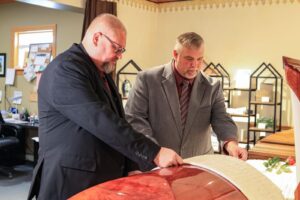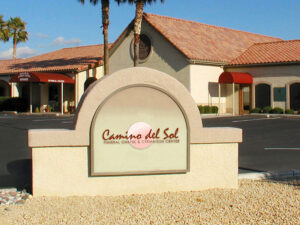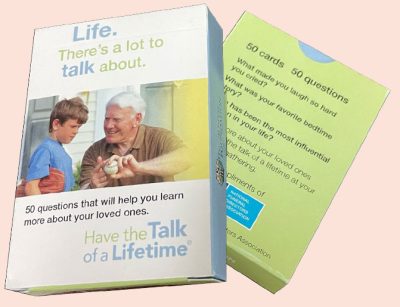Hearing the word ‘funeral’ often brings to mind images of somber services that mark the end of a loved one’s life. You may recall specific memories from the last funeral you attended: the setting, the family and friends gathered, or the presence of a cremation urn or casket.
For me, the word ‘funeral’ immediately conjures up another term: ‘director’, as in ‘funeral director’. This connection likely stems from knowing all too well that without a funeral director, a structured, personalized end-of-life gathering would not be possible.
That’s why when I think of a funeral, I envision the licensed funeral directors who orchestrate the entire process, ensuring every detail is precisely handled in a timely fashion.
I feel it is important to share that the concept of ‘funeral’ also carries personal significance for me —my husband has been a funeral director for nearly four decades, and my late father also dedicated his life to this calling.
Being both the spouse and daughter of funeral directors has given me the unique perspective to witness firsthand the nature of this career. Realizing that not everyone has the same vantage point, I’d like to spend some time exploring the role of the funeral director.
Family Consultant

One of the primary responsibilities of a funeral director is to act as a family consultant.
In the tender moments following a death, families visit the funeral home for an arrangement conference. This meeting is critical, intended to gather detailed information and opens discussions on various elements of funeral planning.
The conversation begins with making key choices, such as deciding between burial and cremation, which depends on personal, family, religious, or cultural considerations.
Next, the director explains the different types of service offerings, helping the family determine the format and tone of the gathering. They also talk about possibilities for music, readings, and eulogies that reflect the deceased’s life and values.
Before finalizing the arrangements, the director provides guidance on the selection of a cremation urn or casket and vault, taking into account both aesthetic preferences and any budgetary limitations. They may assist in selecting additional items like memorial cards and flowers as well.
Event Planner & Coordinator

When a loved one will be honored with a memorial service or traditional funeral, the director’s role evolves into that of an event planner.
They are entrusted with organizing a gathering that enables those left behind to pay tribute to the deceased in a heartfelt, meaningful manner. This aspect of their job necessitates meticulous attention to detail and the ability to juggle multiple tasks at once.
The director coordinates the dates, time, and location of the service, as well as arrangements for flowers, officiants, musicians, and other participants. In doing so, they make sure that each part of the service aligns with the family’s desires and unfolds seamlessly.
Administrative

Funeral directors ease the burden on families during times of loss by handling numerous administrative tasks, allowing the bereaved to focus on remembering cherished moments.
A director’s primary responsibilities include the filing of death certificates and securing permits for burial or cremation. They also advise families on legal requirements so that all procedures are correctly followed according to local regulations.
Writing the obituary is yet another task managed by funeral directors. They see to it that the obituary is thoughtfully written, thoroughly proofread, and placed in newspapers, and posted on the funeral home’s website.
Beyond these duties, directors must notify social security, apply for any veterans’ benefits, and, if applicable, manage insurance claims. These job functions may involve making multiple phone calls, filling out numerous documents, and maintaining frequent email communication.
Caring for the Deceased

The handling of a loved one’s remains is a delicate process that will vary depending on the selected form of disposition and the decision to hold a visitation or service.
Typically, the preparation involves cleansing, cosmetic application, and dressing of the deceased. When a public viewing or formal ceremony is planned, embalming is required, and the body is placed in a casket.
The presentation of the departed holds immense importance, serving as the central focal point of the gathering. The director ensures that the body is displayed in a dignified manner that offers a natural and peaceful remembrance for family and friends.
Emotional Support and Counselor

Funeral directors are dedicated to extending emotional support to those left behind. Trained to handle every situation with empathy and tact, they help families navigate the overwhelming sadness and confusion that accompany loss.
Their mere presence, combined with a willingness to listen, can offer immense comfort to the bereaved. Many times, they go above and beyond by recommending resources, such as counseling services, books, or grief support groups, to help families gain a sense of closure.
A funeral director’s ability to seamlessly balance professionalism with genuine compassion provides a source of solace for families during one of the most challenging times of their lives.
Parting Thoughts

The profession of a funeral director demands a strong sense of ethics, effective communication skills, and an unwavering commitment to serving families.
Funeral directors are instrumental in concluding life’s final chapter, ensuring that each individual is honored in a dignified way and every family can move toward a path of healthy healing.
In closing, I hope this blog has deepened your understanding of the special role these professionals play and has fostered greater appreciation for the invaluable service they provide to our communities.




